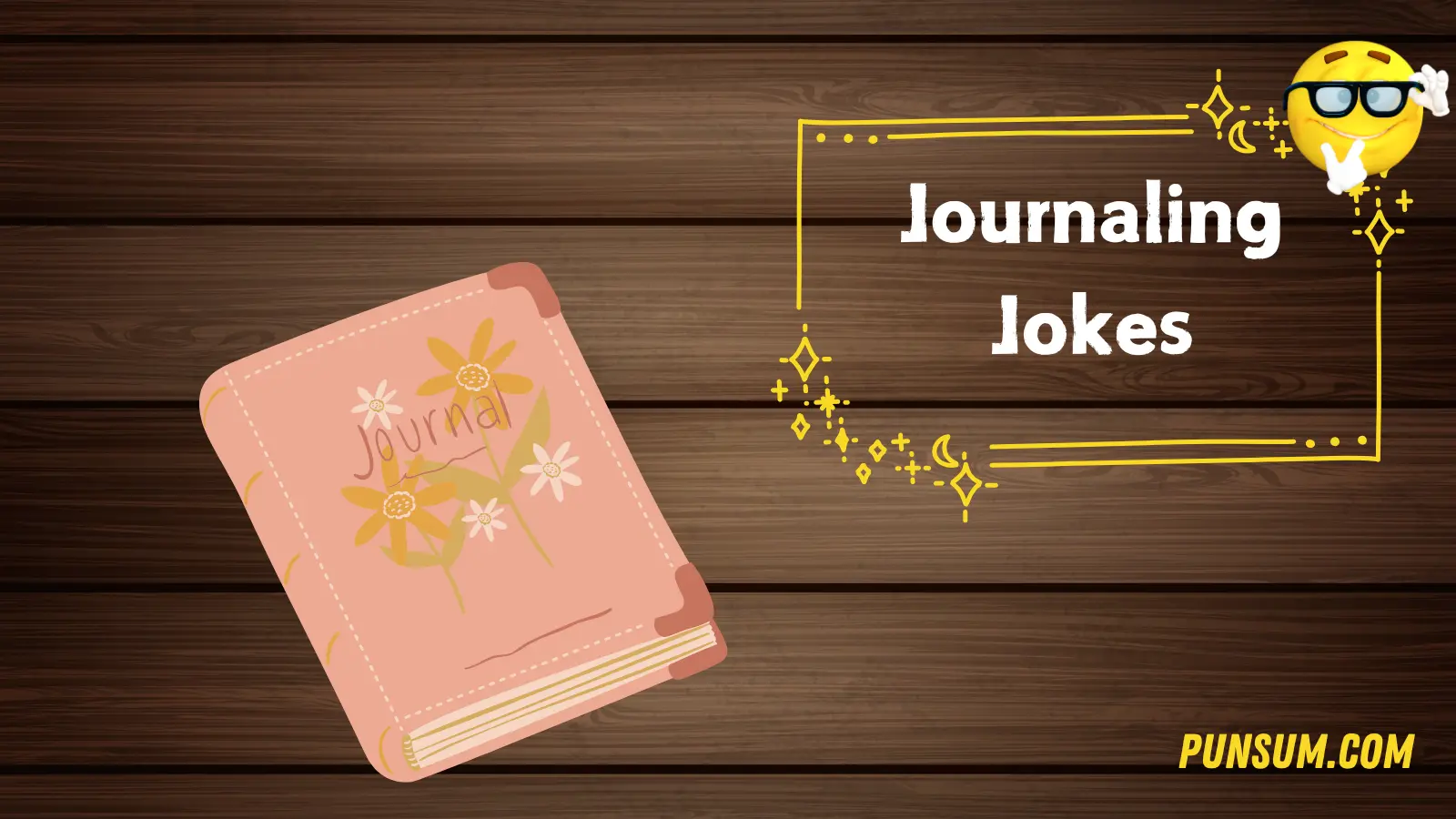Journaling isn’t just about capturing your thoughts or organizing your day—sometimes, it’s about capturing a laugh!
If you’re scribbling down memories or jotting down reflections, a little humor goes a long way to brighten your pages.
This collection of journaling jokes will add a twist of fun to your daily writing routine, perfect for anyone who loves a good pun or needs a smile while reflecting on their day.
Get ready for a blend of wit and wordplay that will make you chuckle as you fill up your journal.
Journaling Examples
Best Picks
- My journal has been keeping all my secrets—it’s a true diary of a madman.
- I started journaling to improve my life—so far, it’s just improving my handwriting.
- My journal asked for a plot twist—so I turned it into a thriller.
- The best part of journaling? It’s the only place where I can talk to myself and still get advice.
- I wrote a journal entry about procrastination—but it’s still not finished.
- When I started journaling, I was hoping for a novel—ended up with a to-do list.
- I wrote a journal entry titled “How to Stay Motivated”—now I’m just waiting for it to motivate me.
- I once made a journal entry about yoga—it ended up being a stretch.
- My journal is full of ideas, but none of them are good enough to act on—it’s just a collection of thoughts gone wrong.
- I keep a journal of my dreams—too bad I keep dreaming of my laundry.
- They say journaling helps you focus—but it just made me focus on snacks.
- I started a gratitude journal—now it’s just a collection of “thank you, coffee” notes.
- Journaling makes me feel like a writer—until I look at my actual writing.
- My journal has a special section for bad ideas—it’s called ‘Tomorrow’s Problem’.
- I journaled about my travel goals—but now my only trip is to the kitchen.
- Journaling: because sometimes your brain needs a good talk session. And your pen is the therapist.
- I tried journaling my thoughts on creativity—but it turned into a doodle session.
- My journal’s tagline: “Come for the reflection, stay for the coffee stains”.
- They say journaling helps you grow—but mine just keeps getting longer.
- My journal and I have a complicated relationship—it always knows what’s on my mind, but refuses to respond.
Journaling Meaning
- Journaling means capturing the fleeting moments—except the ones I forgot to write down.
- When I think of journaling, I think of reflecting on life—then I remember I forgot to reflect today.
- I started journaling to express myself—now I’m just talking to my notebook.
- I asked my journal for some advice—it told me to turn to page 42.
- People say journaling can clear your mind—but sometimes it just gets cluttered with doodles.
- Journaling is the art of self-reflection—and forgetting to do it for weeks.
- My journal is a safe space—except when I spill coffee on it.
- Journaling is all about honesty—unless you’re journaling about a bad haircut.
- When journaling becomes a habit, it’s no longer about writing—it’s about filling in blanks.
- I journal to make sense of life—but my handwriting makes it harder.
- Journaling helps me process my feelings—mostly confusion and hunger.
- Some say journaling is like meditation—I say it’s like a therapist that doesn’t talk back.
- My journal is the only place where my thoughts make sense—until I read them again.
- Journaling is a tool for self-discovery—if I can discover where I put the journal.
- I thought journaling would help me find clarity—but now I just can’t find the right pen.
- Journaling is a personal journey—mostly to the coffee shop for refills.
- My journal is my best listener—too bad it’s not great at advice.
- They say journaling can help you declutter your mind—but mine just makes a mess.
- Journaling is a great way to document your life—or at least document your food choices.
- They told me journaling helps with self-awareness—but I’m just aware of how messy my pages are.
Journaling and Its Benefits
- Journaling helps reduce stress—unless you lose your journal, then it’s extra stress.
- The benefits of journaling? It’s like therapy, but with more coffee stains.
- Journaling improves memory—except the memory of actually journaling.
- Journaling makes you more creative—or at least it makes you think you are.
- My journal is the best place for self-reflection—and for inventing new ways to procrastinate.
- They say journaling improves your writing—I’ll let you know once I start writing consistently.
- The best part of journaling? The sense of accomplishment after one full page.
- Journaling boosts your mood—until you read your terrible handwriting.
- I started journaling to be more organized—but now it’s just organized chaos.
- Journaling helps you think deeper—or at least pretend to.
- The benefits of journaling are endless—but my time for it is not.
- Journaling can improve your emotional health—especially when you finally get to vent about that bad date.
- Journaling is said to boost productivity—but I’m still stuck on page one.
- Journaling helps you manage anxiety—but sometimes it gives me a headache.
- Journaling has helped me become more mindful—unless I’m scrolling through my phone instead.
- The benefits of journaling? My pen says, “It’s about time!”.
- They say journaling is like a mental detox—but I’m just detoxing from bad decisions.
- Journaling allows for personal growth—but only if you can grow enough to finish a journal.
- Journaling improves your mood—unless you write about your credit card bills.
- They say journaling enhances creativity—but I’m still waiting for the ‘Eureka!’ moment.
Journaling Explained
- Journaling is writing down your thoughts—unless you just write your grocery list.
- Journaling helps you organize your life—but it’s really just organizing your procrastination.
- To journal is to express yourself—or to doodle and hope someone thinks it’s art.
- Journaling is a form of self-expression—unless it’s just a list of complaints.
- Writing a journal entry means reflecting—or ignoring your problems until the next entry.
- Journaling is about putting thoughts on paper—or just scribbling until you remember what you were thinking.
- Journaling gives clarity—or a confusing trail of tangents.
- It’s called journaling—not because it’s fancy, but because it’s all about words on paper.
- Journaling lets you unload your mind—then you write a page about what’s for dinner.
- Journaling is a way of keeping track of your life—especially the parts you forget.
- When you journal, you’re processing emotions—or trying to find your pens.
- Journaling is a way to capture memories—if you can remember to write them down.
- Journaling helps you focus—unless you’re journaling about distractions.
- Journaling gives you an outlet for creativity—or at least an excuse to doodle.
- They say journaling is therapeutic—but it’s also therapeutic when you can’t read your own writing.
- To journal is to engage in a conversation with yourself—or to ask yourself questions you’ll never answer.
- Journaling explains your thoughts—especially the ones you don’t understand yourself.
- Writing in a journal helps clear your mind—or just fills it up with more stuff to write about.
- Journaling is a form of self-care—if you can find the time for it.
- Journaling explained: It’s your thoughts, your words, and your mess.
Journaling Meaning in Urdu
- Journaling in Urdu means recording your thoughts—and then wondering if you spelled them right.
- Journaling in Urdu is a way to express emotions—or express confusion about grammar.
- Writing a journal in Urdu helps you reflect—or reflect on how to improve your Urdu handwriting.
- Journaling in Urdu makes your thoughts more colorful—unless you’re stuck on one word.
- Urdu journaling is an art form—or at least it looks like art to someone else.
- Writing a journal in Urdu brings clarity—or a new set of spelling mistakes.
- Journaling in Urdu is like a conversation with yourself—except you’re not sure if your handwriting is still legible.
- Journaling in Urdu gives you a creative outlet—or a reason to google half the words.
- Urdu journaling is a way to track progress—or to track how many words you misspelled.
- Journaling in Urdu can help you grow—but only if you can find your dictionary.
- Writing a journal in Urdu is a way to capture memories—or capture a headache from all the vowels.
- Journaling in Urdu makes life simpler—except when you’re unsure about word order.
- The beauty of journaling in Urdu? Every page is a new adventure in language.
- Journaling in Urdu means you can write down feelings—or write down words you barely remember.
- Urdu journaling helps you reflect on life—or at least reflect on your grammatical errors.
- Writing a journal in Urdu is a therapeutic experience—until you try to write the word “therapeutic”.
- Journaling in Urdu can be funny—unless you’re making the same mistakes every day.
- Urdu journaling connects you to your culture—or at least connects you to Google Translate.
- Writing a journal in Urdu allows you to be honest—except about your handwriting.
- Journaling in Urdu is a good habit—but only if you have an Urdu teacher nearby.
Journaling in Urdu
- Journaling in Urdu is my way of communicating with myself—and my dictionary.
- I write in Urdu because it’s the only language my journal respects.
- Writing a journal in Urdu is a way of keeping track of my thoughts—and my spelling mistakes.
- Journaling in Urdu lets me express myself—or express confusion with Urdu grammar.
- I use Urdu journaling to reflect on my day—and on how often I forget the right words.
- My Urdu journal knows me better than anyone—except when I forget how to spell ‘thoughts’.
- Writing in Urdu feels therapeutic—until I hit a word I don’t know.
- Urdu journaling helps me stay organized—or at least pretend to be organized.
- I write in Urdu to stay connected to my roots—or to stay connected to Google Search.
- Journaling in Urdu makes me feel more creative—especially when I remember all the words wrong.
- Urdu journaling helps me track my emotional growth—and my need for more Urdu lessons.
- Writing a journal in Urdu brings peace—or at least the peace of mind after finding the right word.
- Journaling in Urdu is my way of releasing emotions—or releasing frustration with vowels.
- I started journaling in Urdu to improve my language skills—now I just focus on not embarrassing myself.
- Writing in Urdu is a chance for self-reflection—or at least reflection on how much I’ve forgotten.
- Urdu journaling allows me to express my innermost thoughts—and my love-hate relationship with grammar.
- Journaling in Urdu means I can express deep thoughts—or deep confusion over tenses.
- Urdu journaling is a creative outlet—when I can find the right words.
- Writing a journal in Urdu feels empowering—but also confusing when the dictionary is missing.
- Journaling in Urdu helps me stay connected to my culture—but mostly, it connects me to the backspace key.
Journaling Kit Pakistan
- The perfect journaling kit in Pakistan includes a pen—and a backup pen for when that one breaks.
- A journaling kit in Pakistan should have a good notebook—and a small prayer for neat handwriting.
- The best journaling kit in Pakistan includes markers—for when you need to highlight your mistakes.
- A journaling kit should have a nice pen—and a bunch of sticky notes for all your unfinished ideas.
- The essential journaling kit in Pakistan? A notebook, a pen, and enough caffeine to get you through.
- A journaling kit in Pakistan must have washi tape—because who doesn’t want to make their journaling look more fun?.
- The best journaling kit in Pakistan should include a set of colorful pens—for when your thoughts are colorful, too.
- A journaling kit is incomplete without a sticky tab—for those times when you forget what you wrote.
- In Pakistan, a journaling kit should always include a coffee mug—for when your notebook doesn’t offer enough warmth.
- A good journaling kit in Pakistan has everything—except the time to actually use it.
- Every journaling kit in Pakistan should have a good quality paper—or at least paper that doesn’t laugh at your writing.
- A journaling kit in Pakistan is perfect with a pen that doesn’t smudge—but then you realize, you didn’t buy the right pen.
- You can’t go wrong with a journaling kit in Pakistan—unless you forget where you put it.
- A journaling kit in Pakistan should come with a book of inspirational quotes—and some scribbled words to make it your own.
- A journaling kit includes a pen—but not a pen that runs out halfway through your entry.
- The best journaling kit in Pakistan should include a notebook that holds up to your thoughts—even if those thoughts are just about dinner.
- A journaling kit in Pakistan should have vibrant stickers—so you can pretend your handwriting is just part of the art.
- The essential journaling kit includes a sturdy cover—because you’ll be carrying it around everywhere.
- A journaling kit in Pakistan should have plenty of pages—so you can fill them up with random thoughts.
- A journaling kit in Pakistan should have room for all your thoughts—or at least your shopping lists.
Journaling End of the Year
- Journaling at the end of the year is a way to reflect—or to wonder where the time went.
- At the end of the year, I journal my resolutions—and then forget them by January.
- Journaling at year’s end is a way to capture memories—or to forget that 2024 was a blur.
- Writing about the end of the year makes me realize—I need to journal more than just the holidays.
- At the end of the year, my journal is full of reflections—and a lot of caffeine stains.
- Journaling at the end of the year is a time to review—or a time to reflect on how much I didn’t do.
- The best part about journaling at year’s end? You get to rewrite the mistakes as lessons.
- I journal my year’s highlights—and also my resolutions that lasted a week.
- At year’s end, my journal turns into a recap—or a page full of crossed-out plans.
- Journaling at the end of the year is a perfect reminder—to plan for next year, but actually do it.
- At the end of the year, my journal is a list—of things I forgot to do and things I’ll forget to do next year.
- Journaling at year’s end brings nostalgia—or a reminder of how fast time flies.
- At the end of the year, I reflect in my journal—and wonder how many more cups of coffee I’ll need.
- My end-of-year journal entry is always filled with hope—and a lot of wishful thinking.
- Journaling at year’s end gives you clarity—especially about how much work is still left for the new year.
- I document my year’s journey in my journal—or I write about how much I forgot to journal.
- Writing at year’s end in my journal is a tradition—and I break it by not doing it.
- At the end of the year, my journal holds everything—except my commitment to journaling every day.
- Journaling at year’s end gives me perspective—or just more questions about what I did with my time.
- My journal at year’s end is the final chapter—unless I forget to close the book.
Journaling Orders
- Journaling orders me to write—and I obey… unless I’m watching Netflix.
- Journaling orders me to reflect—but I’m just reflecting on why I’m still in bed.
- My journaling orders are simple—write something every day, and then forget to do it.
- I follow my journaling orders—except the one about no doodling.
- My journaling orders include: write about your thoughts, and also about your laundry.
- I follow my journaling orders, and they lead me—straight to procrastination.
- Journaling orders me to be mindful—unless I’m thinking about food.
- My journaling orders come with instructions—but I still lose the pen.
- Journaling gives me orders—but I turn them into suggestions.
- Journaling orders are easy—but carrying out the orders? Not so much.
- I follow my journaling orders and reflect—mostly on how much time I waste.
- My journaling orders are clear—write your feelings, and then forget where you put the journal.
- Journaling orders me to stay organized—and I organize my thoughts in circles.
- My journaling orders are to be honest—but sometimes, I skip a few details.
- Journaling orders me to express—or at least pretend I’m expressing something profound.
- The best journaling orders? Write more, worry less.
- Journaling orders me to reflect on the day—but I’m busy reflecting on my snack choices.
- My journaling orders include one rule—write now, reflect later.
- Journaling orders me to put down my thoughts—but they’re all about breakfast.
- I follow my journaling orders—but the journal seems to be more organized than I am.
Short Journaling Jokes
- I journal because talking to myself is considered weird.
- My journal is always there for me—unless I forget where I put it.
- I journal so I can remember—but I forget what I wrote five minutes later.
- Journaling is my therapy—except my journal charges me in coffee.
- Journaling has taught me a lot—like how bad my handwriting really is.
- My journal is my safe space—unless my pen runs out of ink.
- I journal so my thoughts aren’t all over the place—except they still are.
- Journaling gives me clarity—or at least it helps me figure out where I left my pen.
- I started journaling to clear my mind—now it’s just full of puns.
- My journal knows all my secrets—except the one about why I started journaling.
- I journal to escape—except my journal keeps reminding me of my problems.
- My journal is a work in progress—and so am I.
- I keep a journal to keep my life organized—and because it doesn’t judge my messy handwriting.
- My journal is my best friend—except when it doesn’t talk back.
- Journaling: because sometimes, I need a conversation—and my pen doesn’t interrupt.
- I keep a journal—because sometimes, my thoughts just need to get out.
- Journaling keeps me grounded—especially when I’m running out of paper.
- I journal so my thoughts have a place—even if it’s the bottom of my coffee cup.
- My journal is my therapist—but it doesn’t charge by the hour.
- My journal keeps all my thoughts safe—unless my cat sits on it.
Journaling Jokes One Liners
- I keep a journal because my brain needs a storage unit.
- Journaling is great—unless you realize you’ve been writing the same thing for days.
- I journal so I don’t forget—but then forget where I put the journal.
- My journal is my therapist—but way cheaper.
- I journal to stay organized—but somehow, I always lose my pen.
- Journaling is my hobby—and my procrastination tool.
- My journal is more honest than I am—except when it refuses to talk back.
- I write in my journal every day—except for the days I forget.
- Journaling is like exercise for your brain—except I always skip leg day.
- Journaling helps me reflect—and procrastinate.
- I journal to express my feelings—but then realize I don’t have any.
- Journaling is like talking to yourself—but with more paper.
- My journal is my best listener—but it doesn’t give good advice.
- I journal to stay focused—but I’m usually focused on coffee.
- I journal to make sense of things—but I usually just make things more confusing.
- Writing in a journal is like therapy—except my journal never asks questions.
- I journal because my thoughts are just too loud.
- My journal is always there—except when I need it most.
- I journal for clarity—or just to find my favorite pen.
- Journaling helps me clear my mind—except when I’m writing about my messy thoughts.
Journaling Jokes Reddit
- I found some great journaling jokes on Reddit—but forgot to write them down.
- Reddit has a great community for journaling jokes—if you can stop scrolling long enough to read them.
- I found the funniest journaling jokes on Reddit—and now I’m too distracted to write them down.
- Reddit is full of journaling jokes—but my journal doesn’t laugh at them.
- I’ve read journaling jokes on Reddit—but they still haven’t helped me find my pen.
- Reddit journaling jokes help me laugh—and also make me realize how unorganized my life is.
- I love Reddit journaling jokes—but they distract me from actually journaling.
- Reddit has the best journaling jokes—but I’ve forgotten all of them.
- I find journaling jokes on Reddit—but forget to journal about it later.
- Reddit journaling jokes are hilarious—but I usually end up journaling about the jokes instead.
- Reddit is great for journaling jokes—except when I end up reading memes instead.
- I love journaling jokes on Reddit—but my journal doesn’t find them funny.
- Reddit has the best journaling humor—and I write it down on the back of my grocery list.
- I keep finding journaling jokes on Reddit—and I keep forgetting to write them down.
- Reddit journaling jokes are my favorite—because they distract me from doing actual journaling.
- Reddit has the best journaling jokes—but my journal keeps spilling coffee on them.
- I found a great journaling joke on Reddit—and then completely forgot it.
- Journaling jokes on Reddit help me laugh—but they don’t help me journal more.
- Reddit has some funny journaling jokes—but now my journal is full of distractions.
- I read a hilarious journaling joke on Reddit—but I’m too distracted to actually write in my journal now.
Journaling Jokes for Adults
- I keep a journal for my personal growth—or at least to keep track of my coffee intake.
- Journaling as an adult means writing down your feelings—or writing down your grocery list.
- Adult journaling is about reflecting on life—or reflecting on how much you need a nap.
- As an adult, journaling is about self-care—or just finding time to write in peace.
- Journaling for adults means more than just writing—it’s about making your messy thoughts look neat.
- Adult journaling is like therapy—except you have to pay for your own coffee.
- Journaling as an adult is a way to grow—or just to track how many hours you’ve worked this week.
- I journal to keep track of my life—mostly my “to-do” lists.
- Journaling for adults is about understanding yourself—and understanding why you never finish a journal.
- I journal as an adult to express my thoughts—and to vent about the laundry.
- Journaling as an adult gives you clarity—or just a reminder that you need more sleep.
- I journal as an adult to make sense of things—or to procrastinate on doing my taxes.
- Adult journaling is all about honesty—except when you’re writing about your diet.
- Journaling for adults is like a mental detox—except for the extra coffee stains.
- Journaling as an adult means reflecting on growth—or just trying to remember what you did last week.
- I journal as an adult to track my progress—or to track how many cups of coffee I’ve had today.
- Journaling for adults means keeping your thoughts organized—except your thoughts never listen to your plans.
- As an adult, journaling is all about making plans—except when those plans include more coffee breaks.
- Journaling as an adult is a habit—or just a way to avoid doing the dishes.
- I journal as an adult to stay grounded—and to pretend my life is more organized than it is.











